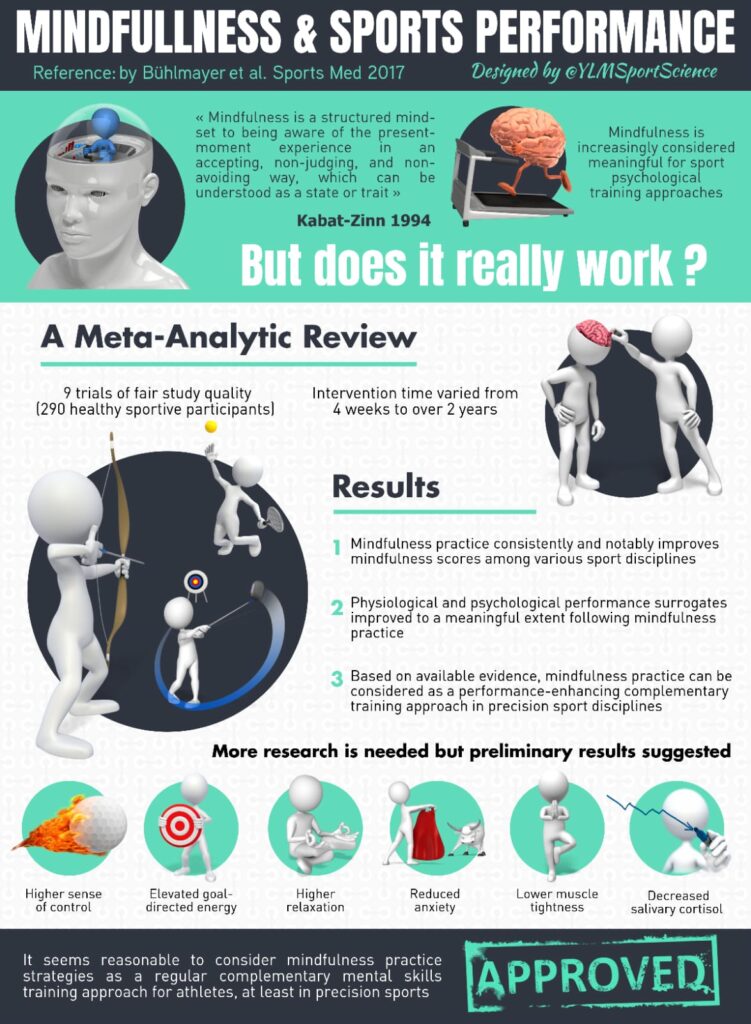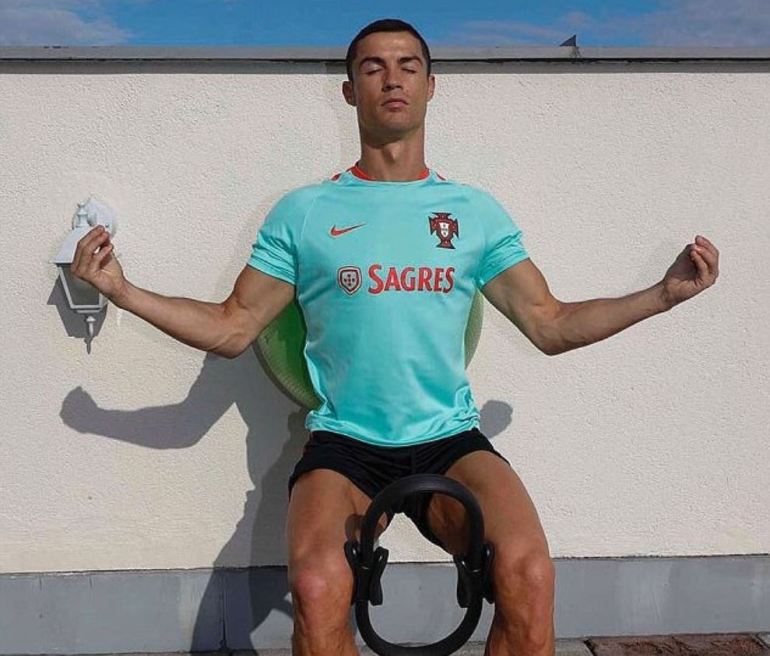The Mental Edge of the Elite
In the high-stakes world of elite sports and business, success is no longer driven by talent and strategy alone—it’s also powered by mental mastery. From Olympic gold medalists to Silicon Valley titans, a growing number of top performers are turning to high-performance mindfulness to gain the mental edge needed to thrive under pressure.
Take LeBron James, for instance—he credits regular meditation with helping him stay centered both on and off the court. CEOs like Marc Benioff of Salesforce have openly discussed the benefits of daily mindfulness in managing stress and making better decisions.
As our lives become more complex and fast-paced, the ability to remain calm, focused, and mentally agile is becoming a competitive advantage. This article explores why high-performance mindfulness is making its way into locker rooms and boardrooms, and how it’s transforming the way we define success.
The Science Behind High-Performance Mindfulness
Neuroscientific research shows that consistent mindfulness practice can rewire the brain. Regular meditation increases the thickness of the prefrontal cortex—the area responsible for decision-making, attention, and self-control—while reducing activity in the amygdala, the brain’s fear center.
This leads to greater emotional regulation and reduced reactivity, which are critical for maintaining composure in high-pressure situations like championship games or crisis boardroom meetings.
On a physiological level, mindfulness has been linked to lower levels of cortisol, the body’s primary stress hormone. Practitioners often experience better sleep, improved immune function, and even reduced blood pressure. These benefits contribute not only to long-term health but also to sustained peak performance.
Cognitively, mindfulness enhances working memory and executive function—key abilities that help athletes and executives process information quickly, block out distractions, and make smarter decisions under pressure.
In sum, the science behind high-performance mindfulness paints a clear picture: it’s not just about relaxation—it’s about creating a neurobiological foundation for excellence in demanding environments.
Why Athletes Are Turning to Mindfulness
With careers hinging on split-second decisions and unwavering focus, athletes are increasingly embracing high-performance mindfulness to stay calm under pressure, reduce anxiety, and enhance their overall performance.
One of the most well-known advocates is LeBron James, who uses the Calm meditation app to center himself before big games and during recovery. He’s spoken about how mindfulness helps him manage the intense stress that comes with being a global sports icon.
Similarly, Novak Djokovic, one of the most successful tennis players in history, incorporates meditation and breathwork into his daily routine to stay emotionally grounded and mentally sharp.
Olympians, too, have adopted mindfulness techniques like visualization and guided breathing to optimize their performance. These practices help them visualize success, build confidence, and bounce back from setbacks more quickly.
Research supports this shift. A study in the Journal of Cognitive Enhancement found that athletes who practiced mindfulness experienced reduced performance anxiety and improved concentration. This is particularly valuable in high-stress competitions where emotional control can determine the outcome.
Mindfulness in the C-Suite: CEOs and High-Level Executives
CEOs and top-level executives face intense pressure, long hours, and constant decision-making that can lead to burnout, stress, and poor judgment. Increasingly, these leaders are turning to high-performance mindfulness as a strategy to enhance focus, regulate emotions, and lead with greater clarity and intention.
Take Marc Benioff, the founder and CEO of Salesforce, who practices daily meditation and even incorporates mindfulness spaces into his company’s headquarters. He credits mindfulness with helping him make better decisions and lead with empathy.
Satya Nadella, CEO of Microsoft, also advocates for self-awareness and emotional intelligence—qualities that are nurtured through mindfulness practices. Media mogul Oprah Winfrey has long promoted meditation as a means of personal and professional transformation, and she even introduced twice-daily meditation breaks for her entire staff.

This infographic from mindfulwholeness.org highlights how mindfulness boosts workplace performance by reducing stress, improving focus, and enhancing employee satisfaction. It also features statistics showing the benefits of mindfulness programs at companies like Aetna and General Mills.
These executives understand that mindfulness isn’t just about stress reduction—it’s a strategic performance tool. In leadership roles where every decision can have major consequences, the ability to stay centered and emotionally balanced can mean the difference between crisis and innovation.
Mindfulness enhances emotional intelligence (EQ), which includes self-awareness, empathy, and the ability to manage relationships—all crucial traits for modern leadership.
In fact, companies like Google, Apple, and LinkedIn offer mindfulness programs and meditation rooms, recognizing that a calm, focused workforce is a productive and innovative one. Some corporations even hire mindfulness coaches or offer mindfulness retreats for their leadership teams.
Studies show that mindful leaders are better at making decisions under uncertainty, managing team dynamics, and avoiding cognitive overload. They also tend to foster healthier work cultures and lead with more authenticity.
Corporate and Athletic Programs: A Growing Industry
What was once seen as a niche wellness practice has now evolved into a multi-billion-dollar industry, with global leaders and elite athletes driving demand for science-backed, performance-focused mindfulness training.
In the corporate world, companies are increasingly investing in mindfulness programs not just as wellness perks, but as strategic assets for employee performance and retention. Tech giants like Google pioneered the movement with their “Search Inside Yourself” program, which combines mindfulness and emotional intelligence training.
On the athletic side, mindfulness has become an essential part of training regimens for professional teams and individual competitors alike. Organizations like USA Basketball and the Seattle Seahawks have introduced formal meditation and visualization sessions as part of their mental conditioning programs.
A wide range of apps and digital tools have also fueled the rise of mindfulness in high-performance environments. Platforms like Calm, Headspace, and Insight Timer offer guided meditations, breathing exercises, and sleep support—all accessible on demand.
Beyond tech, corporate retreats and executive coaching programs that emphasize mindfulness are gaining popularity. These immersive experiences often combine meditation, leadership training, and strategic thinking in environments designed to promote deep reflection and clarity.
In both the boardroom and on the playing field, mindfulness is proving to be more than a passing trend. It’s a scalable, evidence-based solution that supports sustainable performance—and the booming industry around it reflects a growing recognition that mental fitness is as essential as physical fitness in today’s competitive world.
Results Speak Louder: The Tangible Benefits of High-Performance Mindfulness
In sports, mindfulness has been shown to significantly improve concentration and mental resilience. Athletes who meditate regularly report being able to stay focused during competition, recover quickly from mistakes, and maintain emotional balance even under pressure.
For example, Phil Jackson, the legendary NBA coach, used mindfulness and meditation techniques with his teams, including the Chicago Bulls and LA Lakers, helping stars like Michael Jordan and Kobe Bryant perform with laser focus and calm. The result? Multiple championship titles and a legacy built on both physical and mental excellence.
In the corporate sphere, mindfulness practices lead to improved decision-making, enhanced creativity, and reduced burnout. Leaders who integrate mindfulness into their daily routines report making more thoughtful, less reactive choices.
A study by the Institute for Mindful Leadership found that 93% of executives who used mindfulness techniques said it helped them create space for innovation, while 80% believed it improved their ability to make better decisions under pressure.
There’s also compelling data around workplace culture. Companies that embrace mindfulness programs see higher employee engagement, better collaboration, and reduced absenteeism.
The physical health benefits of mindfulness are equally significant. Studies have shown that consistent mindfulness practice can lead to lower blood pressure, improved immune response, and better sleep—all of which are critical for sustained high performance.
Those who commit to the practice often describe it as a game-changer in both their professional and personal lives—a way to maintain focus amidst chaos, regulate emotions in heated moments, and approach challenges with clarity and calm.
The Science Behind the Practice: Why Mindfulness Works
Over the past two decades, scientists have increasingly turned their attention to the mechanisms of mindfulness, uncovering why and how it leads to measurable improvements in focus, emotional regulation, and decision-making.
Neuroimaging studies using fMRI scans have shown that consistent mindfulness practice actually changes the structure and function of the brain. For example, researchers at Harvard found that just eight weeks of mindfulness meditation led to increased gray matter density in the hippocampus—a region associated with learning and memory—and reduced volume in the amygdala, the brain’s stress and fear center.
In fact, mindfulness has been shown to improve attention span and working memory, allowing individuals to process information more effectively and stay locked in on their goals.Studies also show that mindfulness helps reduce rumination and anxiety, leading to a calmer, more grounded state of mind conducive to peak performance.

This visual summarizes a meta-analytic review on how mindfulness positively impacts sports performance, increasing focus, relaxation, and goal-directed energy while reducing anxiety and muscle tension. It emphasizes the potential of mindfulness as a core training component in precision sports.
Another reason mindfulness is so effective is its influence on the autonomic nervous system. Practices like deep breathing and body scans help activate the parasympathetic nervous system—the body’s “rest and digest” mode—counteracting the chronic activation of the stress-driven “fight or flight” response.
From the Mindfulness-Based Stress Reduction (MBSR) framework pioneered by Jon Kabat-Zinn to cognitive-behavioral adaptations like Mindfulness-Based Cognitive Therapy (MBCT), the field has grown more rigorous and specialized, making it more appealing to results-oriented professionals.
The Future of Mindfulness in Elite Circles
In the corporate world, we’re witnessing a shift from sporadic mindfulness workshops to embedded, long-term programs. Companies like Salesforce and **Intel **are creating in-house mindfulness centers, hiring full-time mindfulness coaches, and using internal platforms to deliver daily meditations.
ke those at Harvard and INSEAD—are incorporating mindfulness into their leadership training modules. Similarly, sports psychology courses are placing greater emphasis on mindfulness as a tool for enhancing both performance and well-being.
Perhaps most exciting is the cultural normalization of mindfulness among high achievers. As top performers openly share their experiences—from tennis legend Novak Djokovic to tech leaders like Jack Dorsey—the stigma around mental training is disappearing. Instead, mindfulness is being reframed as a sign of strength, clarity, and intentional leadership.
Frequently Asked Questions on High-Performance Mindfulness
What is high-performance mindfulness?
High-performance mindfulness is a specialized form of mindfulness that focuses on enhancing mental clarity, emotional regulation, and sustained focus, especially under high-pressure environments like competitive sports or corporate leadership.
How is it different from regular mindfulness?
While traditional mindfulness emphasizes relaxation and general well-being, high-performance mindfulness is goal-oriented, designed to boost performance, resilience, and recovery for peak performers.
Why are athletes turning to mindfulness?
Athletes use mindfulness to improve focus, manage pressure, recover from setbacks quickly, and stay mentally present during competitions, which contributes to consistent high-level performance.
What benefits do CEOs and leaders gain from mindfulness?
CEOs use mindfulness to improve decision-making, enhance emotional intelligence, reduce stress, and foster a more mindful, productive workplace culture.
Is there scientific evidence behind mindfulness?
Yes, numerous studies have shown that mindfulness leads to structural changes in the brain, including reduced amygdala activity (stress response) and increased gray matter in areas related to memory and emotional regulation.
Can mindfulness help reduce burnout?
Absolutely. Regular mindfulness practice has been linked to lower levels of stress and burnout, especially in high-pressure professions like healthcare, education, and executive leadership.
How much time should I spend practicing mindfulness daily?
Even 10 to 15 minutes a day can bring noticeable benefits. Consistency is more important than duration, especially when integrating mindfulness into a high-performance lifestyle.
Are there any top athletes known for using mindfulness?
Yes. Elite athletes like Novak Djokovic, Kobe Bryant, and LeBron James have publicly credited mindfulness and meditation with improving their mental game and performance.
What mindfulness techniques are most effective for high performance?
Techniques such as breath awareness, body scans, visualization, and mindfulness-based stress reduction (MBSR) are commonly used in high-performance settings.
Can mindfulness enhance creativity and innovation?
Yes. Studies show mindfulness fosters divergent thinking and helps leaders access creative solutions by promoting a calm, open, and non-judgmental mental state.
Is mindfulness taught in business schools or leadership programs?
Many leading institutions like Harvard and INSEAD now incorporate mindfulness training into their executive education programs to help leaders manage complexity and uncertainty.
Can mindfulness improve physical health as well?
Yes, mindfulness is associated with reduced blood pressure, better sleep, improved immune response, and lower levels of chronic inflammation.
Are there mindfulness tools designed for professionals?
There are apps and platforms like Headspace for Work, Calm Business, and Muse that offer customized programs and performance tracking for professionals and teams.
How does mindfulness impact team performance?
Mindfulness improves communication, empathy, and collaboration, leading to stronger team dynamics and a more cohesive work or training environment.
Is mindfulness suitable for people with no prior meditation experience?
Yes. Mindfulness is highly accessible and can be practiced by beginners. Guided meditations and structured programs make it easy to start and stay consistent.
Can mindfulness be practiced during a busy schedule?
Definitely. Micro-practices like mindful breathing, short pauses before meetings, or mindful walking can be integrated into even the busiest routines.
How long before I see results from mindfulness?
Some benefits, like reduced stress and improved focus, can appear within weeks of consistent practice. Long-term changes in mindset and performance deepen over months.
Is mindfulness a spiritual or religious practice?
While mindfulness has roots in Buddhist traditions, modern high-performance mindfulness is secular and science-based, focusing on practical mental training.
Can mindfulness help in conflict resolution?
Yes. Mindfulness encourages non-reactivity and self-awareness, which are critical for de-escalating conflict and fostering thoughtful, empathetic responses.
Are mindfulness results measurable in performance metrics?
Yes. Many organizations track improvements in productivity, decision-making, and employee satisfaction after implementing mindfulness programs. Athletes also report measurable gains in reaction time, focus, and emotional control.





